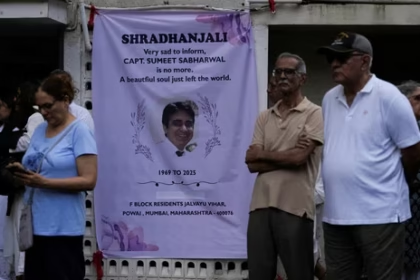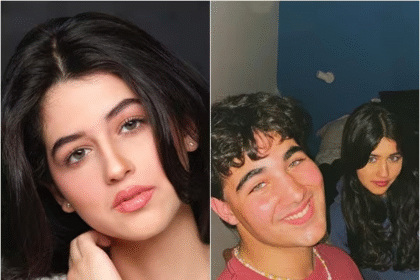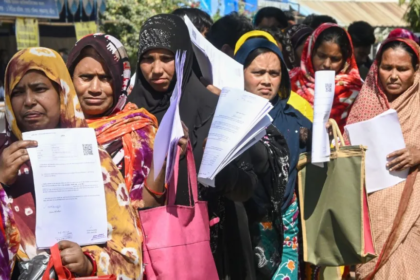“They Treat Us All Like Terrorists”: Over 350 Cops Raid Muslim Localities in Borivali and Padgha
Borivali-Padgha: The 3 am knock at Shaeeda’s* door was not unusual. A knock at that hour typically meant a large contingent of police had arrived to turn their lives upside down. This was the case on the intervening night of June 1 and 2, when over 350 policemen, including members of the Mumbai and Thane local police, led by Maharashtra’s Anti-Terrorism Squad (ATS), surrounded the quiet Borivali-Padgha village, over 55 kms away from Mumbai. In a coordinated operation, the teams, armed with court-issued search warrants, simultaneously knocked on the doors of 22 individuals and began the raids.
“The raids were to target only 22 individuals (three of whom were brothers living together), but the entire village was cordoned off, and police took positions as if dreaded terrorists were hiding here,” Shaeeda says.
Shaeeda says it was the second large-scale raid in the village in less than a year and a half. In the previous raid and arrests conducted by the National Investigation Agency (NIA) in December 2023, her husband was one of 15 people arrested for allegedly “influencing youths” in the region to join the banned terrorist organisation, ISIS. “Last time, around the same hour, they took my husband away and seized all the phones and the computer hard disk my children use for school projects,” she recalled.
The previous raid coincided with the beginning of Israel’s genocidal war in Palestine. Shaeeda’s school-going children had used their pocket money to buy Palestinian flags for a protest they planned in the village. The flags were confiscated, and the NIA later claimed they belonged to the “militant group Hamas.” These claims, often made during raids and arrests, fuel a media frenzy and help secure initial custody remands in court. However, their validity takes years to be proven in court. By then, entire generations, entangled in the prolonged pursuit of justice within the criminal justice system, are devastated.
This time, the ATS arrived with a search warrant issued against one of her sons. The ATS had secured search warrants from a local court on the grounds that “incriminating documents/material” used for “illegal/antinational” activities were stored in their houses. In the raid, which lasted nearly 10 hours, the police seized 19 mobile phones, one sword and a chopper. Villagers claim that what the police and media have called a “deadly weapon” is essentially a kitchen knife.
“Is it really so unusual to find large, sharp knives in a household kitchen, especially in homes that consume fish and meat?” asks one of those whose house was raided.
After the raid and the seizure of a sword and a chopper, two separate FIRs were registered. The police haven’t made any arrests in the village so far.
In the last raid, carried out in 2023, the police made even bolder claims that a large cache of choppers was seized. “After that, almost all of us threw away large knives and have been using small ones in the kitchen. You don’t know when the police will enter our house and turn our kitchenware into ammunition,” said a young woman whose house was among those raided in 2023, though no arrests were made.
The local Padgha police accompanied the ATS during the raid. In one house, belonging to a Maulana, a religious scholar, the police claimed that two cows were kept without adequate paperwork. The Padgha police arrested the Maulana under the Maharashtra Animal Preservation Act. He was released on bail a day later.
At the centre of controversy for decades
Borivali-Padgha is situated on the Mumbai-Nashik highway. The village, with more than 80% Muslim population, has been at the centre of controversies for nearly four decades. It all began with former firebrand student leader Saquib Nachan’s tryst with law enforcement agencies as early as the 1980s. Like Nachan, many others were accused of being a part of the Students’ Islamic Movement of India (SIMI), an organisation that came to be later banned in early 2001.

Nachan, who has faced multiple terror trials, been convicted, and served many years in jail, is accused of heading an ISIS module in the state. He and his younger son Shamil have been in custody since 2023. While Nachan is currently lodged in Delhi’s Tihar jail, Shamil is held in Taloja jail in Mumbai.
The ATS claims the recent raid was carried out based on intelligence inputs that the Nachan family still controls the village, even after their arrest. Borivali-Padgha village, with a population of nearly 10,000, largely houses Konkani Muslims. The Muslims here are financially well-off, owning large expanses of land along the Mumbai-Nashik highway. Over the past decade, land prices here have soared exponentially with several warehouses being established. The locals here traditionally dealt in fishing, sand or construction business. But the constant police raids have impacted their business greatly, they claim.
Most villagers are related to each other. The line of questioning, locals say, revolves around their “association” with the Nachans. “Most of us are directly or remotely related to each other, including the Nachan family. We live next to each other, visit the same Masjid; we are bound to be in touch. How can that be termed illegal?” asks a young man who was among the 22 individuals raided this time.
This time, when the ATS came, they targeted another of Nachan’s sons, Aquib. The warrant named him, and the police seized his phone. A relative present in the house at the time of the raid said that the moment the police barged in, Shamil’s five-year-old son screamed in horror. “The child has seen far too much at such a young age,” she said.
How the raids impact children
Growing up and living in Borivali-Padgha village has not been easy. The raids and arrests have become so normalised over the years that they are now a common game among children. “The children here have invented their own games. They play raids, jail mulaqats, and arrests,” a mother shared, as her young children and a few neighboring kids surrounded us, curiously listening to the conversation.
Shielding the kids from these conversations is futile, they say. “How do we insulate them when police come knocking at our doors at absurd hours and treat not just one or two people as suspects, but the entire village as terrorists?” asked a young girl who recently passed her class 10th exam. The police had come looking for her elder brother this time. “They took my phone, too, and scrolled through the contact list and apps. The moment they started going through my photo gallery, I decided it was enough. I had to snatch my phone away and sternly say I am a young girl and they are unlawfully trying to access a young girl’s photo gallery.”
Among the 22 search warrants, at least two individuals were away on Haj pilgrimage. The search team, however, entered their houses, too. Only their two teenage daughters, locals say, were home at the time of the raid. “The ATS claimed they had solid intelligence inputs. They surely must have known young girls were alone in the house, yet they carried out the raids. Is that even legal?” asked a relative.
Young boys, barely in their teens, complained of being picked up and questioned by the police on multiple occasions. “They ask us about things from before we were born. When we tell them we don’t know about the ‘80s and ‘90s, they don’t trust us,” said a 22-year-old man.
‘Media is not interested in hearing our side’
The media, locals say, further reinforce the police’s actions by delivering one-sided news, never bothering to understand the impact of such police actions on the community. Each time there is a raid, media crews descend in large numbers. “They are not interested in hearing our side of the story but in spreading anti-Muslim rhetoric,” claims Saeed*.
He cites an instance where a team of TV reporters secretly began filming the village from a car. “I was puzzled why they had to take such shaky, blurred visuals from the car. I even asked one of them to get out, meet the locals, and interview them. But they refused,” Saeed says. He believes this was done deliberately to portray the village as a “dangerous” place, even for reporters.
Among the many theories floated by the police, the one that captured media attention alleges that Nachan declared the village an “independent Islamic state” and renamed it “Al-Sham,” a term evoking the territorial ambitions of the terrorist group ISIS. Locals scoff at the claim. “Our village is home to Muslims, Dalits, and Adivasis who have historically celebrated each other’s festivals,” says an elderly resident with a history of incarceration. “We collectively organize an annual Ganpati procession. How could any of this happen in an ‘Islamic state’?” he asks.
Wasima Mulla, a 65-year-old woman who died of a heart attack upon seeing the police enter her house. Her family refused to speak, but locals narrated how the woman panicked when police raided her daughter’s house. “She began screaming and then fell to the floor,” a neighbor recounted. Even after learning she had died, the police didn’t allow her son-in-law to see her, the neighbor claimed.
The raid, if it was so important, could have been carried out during the daytime, villagers feel. “They wanted us to panic, they wanted people to be shocked, they wanted to send a message that they can do anything they wish and no one can question them,” an elderly woman said.
Also Read: COVID-19 cases in India climb to 6,491, no deaths in past 24 hours








